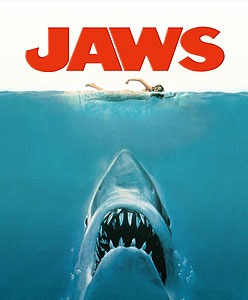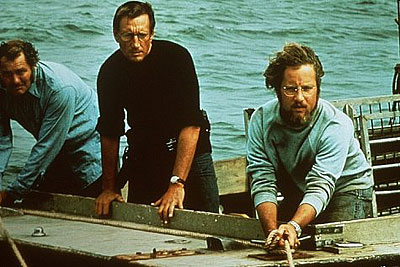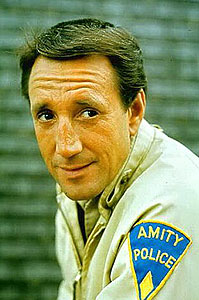Jaws: The Shark Has Always Worked
Published on December 5th, 2011 in: Dancing Ourselves Into The Tomb, Documentaries, Issues, Movies |By Lisa Anderson

One of my favorite movies was released three years before I was born.
Jaws, the ground-breaking 1975 film by Stephen Spielberg, is one of the movies that I’ve seen more times than I can count. Like The Matrix, it’s also a film that I consider perfect; I can’t think of anything that could be added, altered, or removed to make it better. That’s not surprising, either; Jaws changed the way movies were made and marketed forever.
Based on a novel by Peter Benchley, Jaws was the first summer blockbuster. It was a high-concept film, and the first movie to get such a wide release. Since then, it has also provided the template for countless suspense and horror movies. After all, how many ideas have been pitched as “It’s Jaws in [a place]”?
The influence of Jaws is not limited to the film industry, however. Its imagery and music are referenced, imitated, and spoofed all across popular culture, to the point that even people who haven’t seen it can recognize them. It’s even made its way into the popular lexicon. You’ll still hear people say “This was no boating accident” when confronted with an obvious cover-up, or “you’re gonna need a bigger boat” when the available resources seem inadequate to the challenge at hand.
Jaws stands out in part because it is more subtle than many of its imitators. Technical difficulties prevented the crew from using the pneumatic shark they had designed as often as had been planned. As a result, the menace of the film’s Great White shark antagonist is more often evoked by John Williams’ iconic score. Most importantly, Jaws is about more than, in the words of a friend of mine who’d never seen it, “people in the water getting bitten.” It’s about how other people react to that situation.
The characters make the movie. Martin Brody (Roy Scheider), police chief of Amity Island, finds himself in a difficult position when an oversized Great White shark movies into the waters of his community. After two swimmers die and the beach is closed, he must make sure the shark is killed, or the local tourist economy will be devastated. He hires biologist Matt Hooper (Richard Dreyfuss), who understands the necessity of killing the shark, but wants to learn as much from it as possible first. Captain Quint (Robert Shaw), a grizzled man of the sea, is an outsider to the tourist economy, but is the one person with what it takes to hunt the monster.
After a third person is found to have been killed the by shark, the three men set off in Quint’s boat, the Orca. The interaction between them on the boat—sometimes impatient, sometimes humorous, but always believable—is the heart of the film. They’re all a little skeptical of each other, and there are power struggles, but they’re in it together.

The best scene takes place at night in the hold of the ship. Brody, Hooper, and Quint get drunk and begin talking and trading stories. There is somber silence as Quint recounts his experience as a survivor of the USS Indianapolis, and laughter as the three begin comparing injuries. They end up singing together: “Show me the way to go home/ I’m tired and I wanna go to bed/ You know I had a little drink about an hour ago/ and it went straight to my head.”
This scene, like much of the interaction on the boat, is extremely real and human. It serves to raise the emotional stakes for the ensuing confrontation with the shark.
Jaws found its success by tapping into a primal fear: a monster that not only wants to kill you, but wants to benefit from it, to make you part of itself. This reaction is made even more visceral by the fact that the sleek elegance of the shark has remained unchanged for millions of years. The dark side of this thrill is that since Jaws‘ release, Great Whites and other sharks have been hunted in numbers far out of proportion to any danger they pose to humans. This has stressed or endangered many species already threatened by the overfishing of their prey and by fin hunting.
Not only did Jaws change the cultural landscape, but it arguably altered humanity’s relationship with the ocean. Even Peter Benchley, author of the novel upon which the film is based, said that he would not have written his novel had he known how Great White sharks actually behaved in the wild. He went on to write two nonfiction books about sharks. Ironically, however, the best bet for increasing people’s understanding and appreciation of sharks—and safety around them—may be educational programming like the Discovery Channel’s Shark Week, which never would have happened without Jaws.

Anyone who wants to learn more about the making and the impact of this classic movie should try to see The Shark is Still Working. This 2007 documentary is narrated by Roy Scheider, and features interviews with many of the people involved in Jaws (including Scheider, Richard Dreyfuss, Steven Spielberg, Peter Benchley, and John Williams) as well as with filmmakers inspired by Jaws. It also includes rare footage and stills. Scheider’s participation in particular, is a coup, since this admirable actor and activist died shortly afterwards, in 2008.
The Shark is Still Working had its festival debut in 2009, and there is no DVD release date yet. Keep your ear to the ground, though, and you can pick up a copy once it’s available, or perhaps catch it on cable or at your local art house theater. And yes, if you’re wondering, the documentary takes its name from Richard Dreyfuss’s funny anecdotes about the PA announcements on the set of Jaws . . . which most often indicated that the shark was not working.
Jaws has lived up to the hype with which it was released over 35 years ago. It has gotten numerous critical accolades and continues to appear on prestigious Top 100 lists. No matter what changes occur in movie-making technology or marketing strategies, Jaws will continue to offer chills, as long as people worry about what might be in the ocean with them.
Time limit is exhausted. Please reload the CAPTCHA.